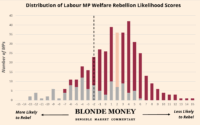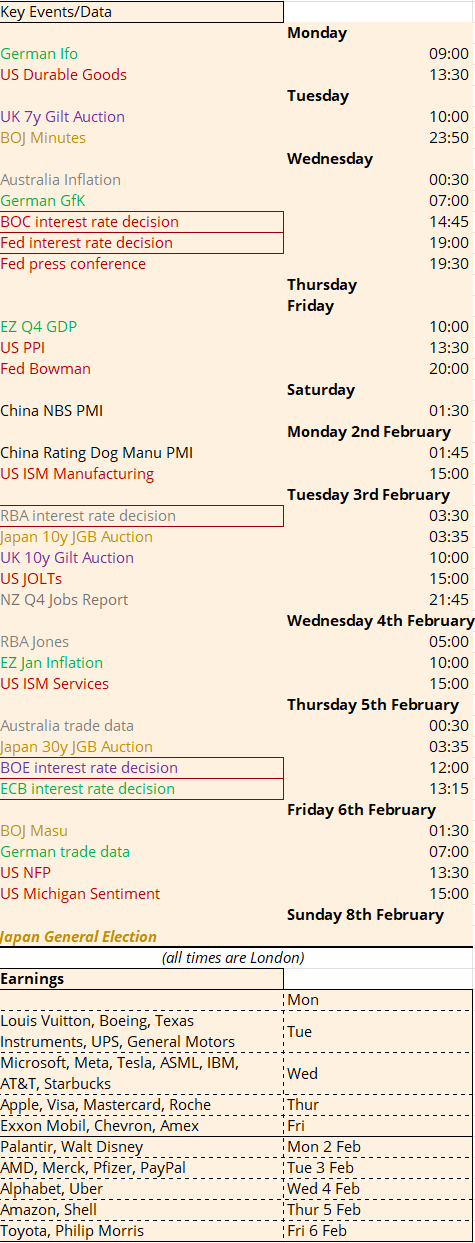
2nd July 2025
Welfare Reform Bill Rebellion – The Impact
- Gilt markets have only just woken up to the unstable path ahead.
- The Labour party itself cannot agree on what it is for.
- But it is fast becoming clear that it does not stand for whatever Starmer and Reeves have been putting forward.
- The spread of MPs in our Welfare Rebellion rankings demonstrates the breadth of opinion within the party.
- Whilst there is a good chunk who are loyal to the leadership, there is a long left tail of rebels who are now in the ascendancy.
- The Labour party itself cannot agree on what it is for.

- The failure of the government to pass the welfare reform bill without neutering its impact has revealed the inconvenient truth: the huge Labour majority has no mandate for what is required to fulfil its fiscal rules
- Our analysis identified 84 potential rebels, enough for the government to lose its majority
- Even with the government’s astonishing last minute concessions, which delayed the tweaks to Personal Independence Payments that would have delivered the bulk of savings, 49 Labour MPs voted against and 18 abstained (although not all of those would be active abstentions) = 67 who did not vote for the bill
- But the way in which this rebellion unfolded has revealed a more disturbing truth: the government cannot govern, at least not in its current constellation.
- The political constraint and the fiscal constraint together have become too binding.
- More borrowing cannot easily be digested by markets without a credible plan for how it delivers growth
- More tax rises eventually reaches a point where the tax burden cannot produce extra revenue
- More public spending isn’t productive enough to bring growth
- But cutting taxes, cutting spending and reducing borrowing are anathema to many Labour MPs who feel the country needs the exact opposite of this after 14 years of Conservative ‘austerity’.
- The political constraint and the fiscal constraint together have become too binding.
- Changing the Chancellor is inevitable.
- The welfare reforms were only introduced at the last minute in the run up to the Spring Statement in order for the OBR to judge that the government was indeed still meeting its fiscal rules.
- The OBR offered a rare rebuke to the Treasury in the foreword to their economic outlook in March for this: ‘Policy costings information on the direct fiscal effects of some measures was received late and without sufficient detail… we have certified the Government’s estimates of their fiscal effects as reasonable and central, but with a high degree of uncertainty attached to them’.
- The welfare reforms were only introduced at the last minute in the run up to the Spring Statement in order for the OBR to judge that the government was indeed still meeting its fiscal rules.
- But it’s not just the Chancellor who is in trouble.
- The Prime Minister and his Cabinet have burnt through months of political capital to fail to deliver cost savings that even the OBR considered highly uncertain.
- The fact that the PM was told for months by his whips that the welfare reforms would struggle to get through parliament but ignored them until the very last minute demonstrates an operation that is unable to legislate.
- Party management is harder with more MPs when there is not enough patronage to go round, nor as much time to chat in the tea room. But it is an integral part of running the country. Starmer giving an interview at the weekend to say he was “heavily focused on what was happening with Nato and the Middle East all weekend. I turned my attention fully to it [the welfare bill] when I got back from Nato on Wednesday night. Obviously in the course of the early part of this week we were busy trying to make sure Nato was a success” belies an astonishing lack of grip for the head of a government. Passing votes through parliament isn’t an agenda item, it’s the very heart of what it means to be the first lord of the Treasury.
- He went on “Things come to a head as the legislation comes into view, with a vote focusing the minds”. No, a government is elected on a platform and then legislates for it. Any changes forced by events must then be sold to the country and to the party itself. Not a last minute afterthought that you think you can ram through by virtue of having won a majority.
- This is where the whole government gets into trouble, even if – when – Starmer goes.
- Without a mandate, it will lurch from tweak to tweak, beholden to the OBR.
- Abandoning the fiscal rules or the OBR would lead to higher yields, worsening the debt/deficit dynamics.
- The political and fiscal constraints will combine to deliver higher long term Gilt yields and a lower GBP. Keep an eye on the 10s30s spread:




